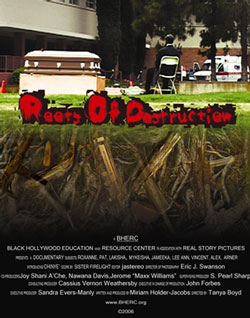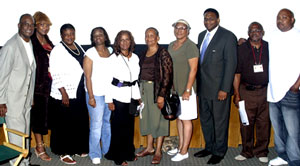
HOLLYWOOD (FinalCall.com) – “Summer time is the killing season,” teenager and gang member Jameeka recurred throughout a 22-minute documentary revealing the plight of parents of active gang members. But it no longer can or has to be–at least that is what film writer Miriam Holder-Jacobs impressed with the July 8 screening of Roots of Destruction at Raleigh Studios.
Roots of Destruction is one of five docudramas selected by the Black Hollywood Education & Resource Center (BHERC) for its Fighting Back With Film Media Project. Sandra Evers Manley, president and founder of BHERC, stated that the series grew out of a challenge to five filmmakers to create projects about the impact and devastation of violence in the community. “Too often in Hollywood, we don’t have enough films with purpose and with a mission,” she explained. “We want to send a message and make sure we stop the killing and this is just our way to try to help make a difference.”
Picture this: The sun is shining and children of various ages are laughing and interacting on a playground. Shots ring out and, in an instant, screaming ensues and their laughter fades away, just like the siren on the ambulance that carries one of them off to the uncertainty of life or death.
Ms. Holder-Jacobs and the film’s director, Tanya Boyd, catapulted the audience into the reality that many parents throughout Los Angeles and increasingly other communities undergo on a daily basis: drive-by shootings, isolation between gunfire of warring sets or victimization of retaliation murders. As the film trailed on, children told how they entered gang banging, while their parents poured out their own dysfunctional childhoods and discussed ways to break the cycles of dysfunctional behavior.
LaKisha believes that breaking the cycle starts with the mother. “I have a strong support system, but what you have to look at is, there is a strong support system in the streets that’s pulling our daughters down,” she said. “I knocked the doors down in the gangsters’ homes. I’m going to get my child.”
She admitted that eventually she realized that wasn’t going to work. “I stopped running into those homes. I took it one step at a time and I allowed her to come to me,” she recalled. “I wasn’t being a bad parent, but I (also) have a 9-year-old daughter that needs mom right now. So if I’m out here chasing my daughter that’s over here in the projects, what’s going on with that 9-year-old that’s sitting back there? I did have to throw my hands up and allow my child to have her own experience.”

LaKisha said that another motive for telling her story was to reveal the truth about what goes on in South Central, compared to what people see on TV, and to share how police did nothing to help, even though she told them who had her daughter and where she was.
“People who are from gangs, usually it’s because they have either no father figure or no mother figure and the gang gives them that discipline that you don’t get from home,” Jameeka pointed out.
LeeAnn, however, said that she was not forced into the lifestyle; she wanted to do it. “I looked at it as, my mama got too many kids, so I gotta go my way to get what I want,” she revealed.
Arner started gangbanging at approximately 14 years old, and although he did have a relationship with his father, he stated, “I think that if my father was in the home, there’s a great chance that I would not have gone as far as I did.” Since rehabilitated, he is now married and a practicing real estate investor.
Chico Brown, a reformed gang member and drug dealer, said that his path to gang banging was completely opposite. “I was in the home with both of my parents and I still went to a gang,” he stated. Many may remember Mr. Brown as a drug dealer, but today he shelters youth at an enrichment center in South Central Los Angeles.
Pat recounted that she went on a three-day binge while in labor with her son. When it came time for her to have him, she took a hit. “I knew they were going to take him. I had heard all the stories,” she recounted. “I went into the nursery and saw him with tubes running down every hole that he had, and now he’s participating in gang activity. He’s 15.”
Even though she accepts her past actions are partly responsible for her son’s present life, she shared that she wrestles with the question of “when do I let go?”
“When do I pull back?” she asked. “Somebody help me with this boy child. I don’t know how to face him. I need help.”
Like LaKisha, her help would not come at the hands of law enforcement authorities. “The system makes it really hard because anything he does, I’m still responsible for it. So I’m like in a Catch-22 position: Either I’m going to get in trouble for something that I do for disciplining him, or get in trouble for something he does,” she lamented.
“We cannot fear the very lives of babies that we have given birth to and neither can we allow this government to come up with wicked laws to where we can’t even control our children,” Western Regional Minister Tony Muhammad cited during the film.
“This documentary is intended to not only save the lives of our young men and women, but to also teach these young parents how to love and respect themselves and each other so that they can love, teach and raise their own babies in a functioning home environment,” Ms. Holder-Jacobs stated, “which in the end makes better citizens and saves your life and mine!”












